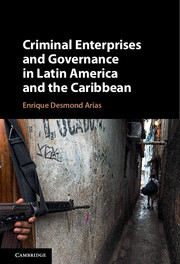Crossref Citations
This Book has been
cited by the following publications. This list is generated based on data provided by Crossref.
Magaloni, Beatriz
Franco Vivanco, Edgar
and
Melo, Vanessa
2016.
Killing in the Slums: The Problems of Social Order and Police Violence in Rio De Janeiro.
SSRN Electronic Journal,
Cockayne, James
2018.
Can organised crime shape post-war transitions? Evidence from Sicily.
Third World Thematics: A TWQ Journal,
Vol. 3,
Issue. 1,
p.
9.
Pawelz, Janina
2018.
Hobsbawm in Trinidad: understanding contemporary modalities of urban violence.
Conflict, Security & Development,
Vol. 18,
Issue. 5,
p.
409.
Sprague-Silgado, Jeb
2018.
Global capitalism, Haiti, and the flexibilisation of paramilitarism.
Third World Quarterly,
Vol. 39,
Issue. 4,
p.
747.
Denyer Willis, Graham
2018.
Violence, bureaucracy and intreccio in Brazil.
Global Crime,
Vol. 19,
Issue. 3-4,
p.
296.
2018.
Schultze-Kraft, Markus
Chinchilla, Fernando A.
and
Moriconi, Marcelo
2018.
New perspectives on crime, violence and insecurity in Latin America.
Crime, Law and Social Change,
Vol. 69,
Issue. 4,
p.
465.
Yashar, Deborah J.
2018.
Homicidal Ecologies.
Albarracín, Juan
2018.
Criminalized electoral politics in Brazilian urban peripheries.
Crime, Law and Social Change,
Vol. 69,
Issue. 4,
p.
553.
Arias, Enrique Desmond
2018.
Criminal organizations and the policymaking process.
Global Crime,
Vol. 19,
Issue. 3-4,
p.
339.
2019.
Coca Yes, Cocaine No.
p.
109.
Andreas, Peter
2019.
Drugs and War: What Is the Relationship?.
Annual Review of Political Science,
Vol. 22,
Issue. 1,
p.
57.
2019.
Coca Yes, Cocaine No.
p.
27.
2019.
Coca Yes, Cocaine No.
p.
192.
2019.
Coca Yes, Cocaine No.
p.
215.
Daly, Sarah Zukerman
2019.
Voting for Victors: Why Violent Actors Win Postwar Elections.
World Politics,
Vol. 71,
Issue. 04,
p.
747.
2019.
Coca Yes, Cocaine No.
p.
150.
Giraudy, Agustina
Moncada, Eduardo
and
Snyder, Richard
2019.
Inside Countries.
p.
2.
Jackman, David
2019.
The Decline of Gangsters and Politicization of Violence in Urban Bangladesh.
Development and Change,
Vol. 50,
Issue. 5,
p.
1214.
Trejo, Guillermo
and
Ley, Sandra
2019.
Inside Countries.
p.
181.



